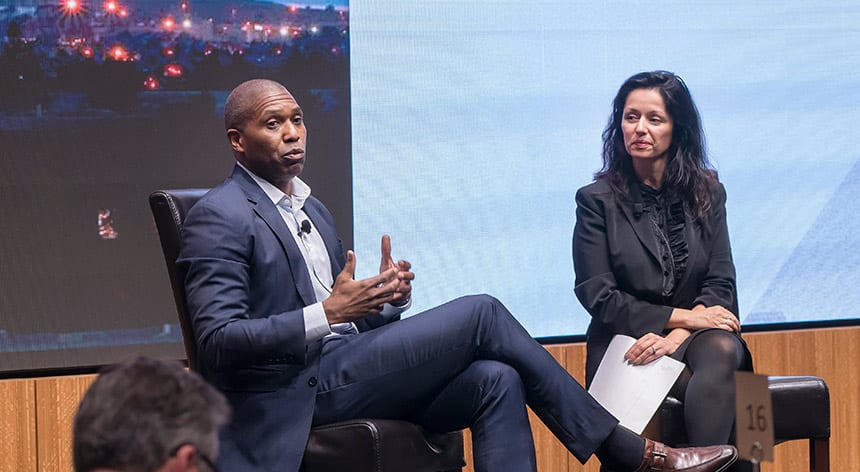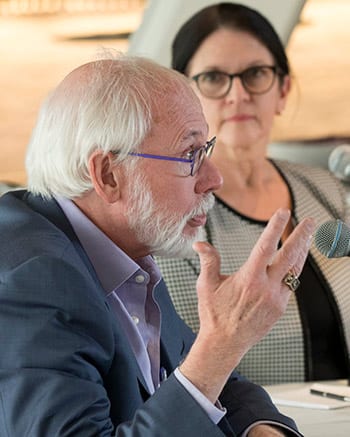
By Andrew Cohen
Investors are increasingly pressuring companies to adjust their focus from maximizing shareholder profits to also making positive societal contributions. Through its curricular offerings and work with businesses, Berkeley Law is emerging as a leader in the corporate sustainability movement among U.S. law schools.
“To date, the legal community has been largely absent from contributing to the global trend of sustainable finance,” said sustainability expert Robert Eccles, a visiting professor at the University of Oxford’s Saïd Business School. “One notable exception is the work being done at Berkeley Law.”

Part of the Berkeley Center for Law and Business, the school’s Business in Society Institute recently hosted Sustainability Week—a series of events for corporate, investment, academic, and nonprofit leaders. Participants included representatives from BlackRock, BNY Mellon, DBL Partners, Intel, Nestlé, Pepsico, Uber, Salesforce, and more.
BlackRock, the world’s largest asset manager, sent a seismic jolt through corporate America when CEO Larry Fink stated in his 2018 letter that, in order to ensure long-term sustainability, “Companies must benefit all of their stakeholders, including shareholders, employees, customers, and the communities in which they operate.”
Institute Director Amelia Miazad ’02 created Sustainability Week. It featured an inside counsel think tank, BlackRock CEO letter symposium, academic workshop, and sustainable business and investment forum (the latter co-hosted with Haas School of Business and the UCOP Investment office). The events tackled business, legal, and ethical questions raised within topics such as equity and inclusion, gun control, artificial intelligence, and privacy.
“BlackRock engages constructively with companies to encourage them to adopt the sound business practices that underpin their financial sustainability over time,” said Michelle Edkins, global head of the firm’s investment stewardship team. “In our experience, companies which have high governance standards—such as quality board and executive leadership and robust control and operational processes—manage well their material environmental and social impacts. Berkeley Law’s recent BlackRock CEO Letter Symposium provided a valuable forum for investors, academics, and companies to engage in an in-depth discussion and debate about how best to embed long-term sustainability considerations into corporate practices and strategy.”
Miazad has developed and teaches Berkeley Law’s sustainability-related courses—some of the field’s only offerings among U.S. law schools—and oversees students who work directly on corporate sustainability issues. The institute recently conducted an analysis of one of Chile’s oldest companies, which implemented its suggested governance changes.
Students attended various Sustainability Week programs, learning directly from high-level decision makers.
“I felt that I was in the right place with the right people who were curious, thoughtful, and committed to something more meaningful than the traditional bottom line,” said 2L Madeleine Smith.
New expectations
According to Institutional Shareholder Services data, over the last two years more than half of shareholder proposal filings related to environmental and social causes such as climate change, gender equity, and board diversity. Social media boycott campaigns are also surging, prompting companies to incorporate sustainability throughout their operation.
“Sustainable investment requires breaking down silos and approaching environmental, social, and governance (ESG) challenges holistically,” said Nancy Pfund, founder and managing partner of DBL Partners. “By convening thought leaders from diverse backgrounds, UC Berkeley is helping the business world to draft sustainability’s next chapter.”

While participants described how that is shaping business models from product design to staff treatment to environmental impact, questions remain about ESG oversight.
“There’s no single governance recipe that works for everyone, but let’s offer more ingredients that companies may find useful,” Berkeley Law Professor Stavros Gadinis said. “Should ESG issues be the responsibility of the whole board, or a board committee, or should there be personnel leading it on the ground? Do companies need a chief sustainability officer?”
Panelists shared data showing companies that are “bad ESG actors” often under-perform financially. They recommended increasing corporate board diversity, adding members with sustainability experience, quantifying ESG measures, and empowering general counsels to help navigate this shifting paradigm.
Fury over firearms
A panel on firearms explored the rise of investors demanding gun control. Remington, one of the nation’s oldest gun makers, filed for bankruptcy this year and Smith & Wesson reported in June that its sales and profits were down 33 and 84 percent respectively from the previous year. Courtney Keating of Glass Lewis, a proxy advisor, described the first two successful shareholder proposals requiring gun manufacturers to research and disclose the safety risks associated with guns.
PayPal and Square stopped processing firearms transactions, and more retail companies are not allowing guns into their stores. Peter Ambler, executive director of the Giffords Law Center to Prevent Gun Violence, believes the new Democratic-controlled House of Representatives “will act quickly and strongly address the gun issue” and cited national polls revealing strong support for universal background checks on firearms.
Miazad noted that corporate engagement on guns has increased after the February mass shooting that killed 17 people in Parkland, Florida. Delta was among the companies that severed ties with the National Rifle Association, despite Georgia’s governor threatening to remove a large tax benefit, and several companies stopped advertising on NRATV.
“The level of activity we’re seeing with companies taking a stand on gun violence is extraordinary,” she said. “Companies are making this an issue even when it has nothing to do with their core business.”
Free market vs. regulation
Participants also debated whether sustainability efforts should be regulated. Arguments ranged from relying on the free market to incentivize investment in ESG-focused companies to mandating immediate regulatory action given the pace of global warming. Pointing outside to smoke-filled air from the California fires, one CEO cautioned, “We just need to move faster” on climate change.
Proponents emphasized that that labor and environmental laws drove early sustainability measures. While most agreed that a regulatory framework for ESG disclosures seems appropriate, they warned against viewing it as a unilateral solution for motivating—and sanctioning—corporate directors.
With corporate sustainability a fast-growing area of law and business, Miazad relishes the expanding opportunities. “Our students come to Berkeley Law hoping to make a positive impact in the world,” she said. “Few imagined that they could make that impact through corporate law.”
One such student, 3L Elvia Lopez, will spend spring semester in a sustainability-focused field placement in Santiago, Chile.
“Corporate law tends to be conceived as lacking opportunities for positive social impact, yet lawyers hold immense power and potential and Berkeley Law is spearheading these discussions in the legal community,” she said. “While the corporate sustainability movement is innovative and forward-thinking, it’s also fundamentally rooted in our professional responsibilities as lawyers.”